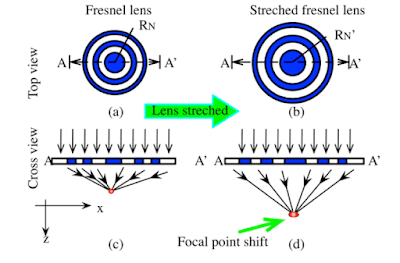Today (May 10, 1788) is the birthday of Augustine-Jean Frennell, who played a significant role in upholding the theory of the wave of light.

Augustin-Jean Fresnel was born on
10 May 1788 in Brockley, Normandy. His early education was sluggish. He did not
know how to read even when he was eight years old. He was the second of four
sons of architect Jack Fresnel. His wife, Augustine, you are Mary. In 1790,
following the revolution, Brockley became part of the expansion of Eur. The
family moved to Mathieu, a hometown of Cherbourg, and Jacques twice. Madame
Fresnel spent 25 years there as a widow. The Fresnel brothers were initially
taken home by their mother. The sick Augustine did not want to be depressed.
But the popular story he began reading until he was eight years old is
controversial. At the age of nine or ten, he did not differ except in his ability
to turn tree branches into toy bows and guns. It worked really well.

In 1801, he was sent to the Ecole
Central in Cain as a company for Augustine Lewis. But Augustine elevated his
performance. In late 1804, he was accepted into the Ecole Polytechnic Institute,
ranked 17th. In 1808, Ecole Polytechnic excelled in drawing and geometry
despite his poor health. In his first year, he won a prize for the solution to
the geometric problem posed by Adrian-Marie Legendre.

By exposing Huygens's principle of
secondary waves and Young's interference in terms of size, and assuming that
the simplest colors are sinusoidal waves, Fresnel gave the first satisfactory
explanation of variation by straight edges. Including the first satisfactory
wave-based interpretation of vertical diffusion. Part of the same frequency but
the addition of sinusoidal functions of different phases is a testament to the
fact that forces with different directions are similar. Fresnel explained the
nature of polarization, the mechanism of color polarization, and the exchange
and reflection coefficients at the interface between two transparent isotropic
media, further assuming that light waves are completely inverse.

By generalizing the
direction-velocity-polarization relationship for the calcite, he calculated the
directions and polarizations of the refractive rays in the doubly-refractive
crystals of the biaxial class (Huygens's secondary wave nodes are not axially
symmetric). The time between the first publication of his pure-cross-wave
hypothesis and the submission of his first correct solution to the biaxial
problem was less than a year. Later, he coined the terms linear polarization,
circular polarization, and elliptical polarization. He explained how the optical
rotation can be understood as the difference in diffusion velocity for both
directions of circular polarization. By allowing the reflection coefficient to
be complex, the polarity shift due to the total internal reflection exploited
in the Fresnel Ramp, the defenders of the established corpuscular theory could
not fit his quantitative descriptions of many instances with very few
assumptions.

After Maxwell's electromagnetic
theory was incorporated in the 1860s by the wave theory of light, some
attention was diverted from the magnitude of Fresnel's contribution. In the
period between the merger of Fresnel's physics and Maxwell's broad integration,
Humphrey Lloyd, a contemporary officer, described Fresnel's cross-wave theory
as "the finest fabric that adorned the domain of physics." Research
in optics has led to the almost unanimous adoption of the theory of the wave of
light. In addition to the rest of Newton's corpuscular theory, he is best known
for inventing fresnel lenses from the late 1830s, using "step" lenses
to expand the visibility of lighthouses, and saving countless lives at sea. A
simple dioptric (completely refractive) step lens, independently reconstructed
by Fresnel, is used in screen magnifiers and capacitor lenses for overhead
projectors.
Frenal had a lifetime of
tuberculosis. Augustine-Jean Frennell, who played a significant role in
upholding the theory of the wave of light, left his world on July 14, 1827, in
his 39th year. Although he did not become a public celebrity in his lifetime,
he lived long enough to gain the recognition he deserved from his peers. His
name is ubiquitous in the Rumford Medal of the Royal Society of London, and in
the modern terminology of optics and waves.
Source By: Wikipedia
Information: Dr. P. Ramesh, Assistant
Professor of Physics, Nehru Memorial College, Puthanampatti, Trichy.
Get information like this
https://t.me/joinchat/jpqj3jQLN51kYTk9
Join Telegram Group.
https://chat.whatsapp.com/HHC5m0Jz3Ue1E8ilgta0YT
Join WhatsApp Group
Thanks.
Also, Read
🛑👍 CSIR-NET Physics Materials and Problems
🛑📕 21 GB and Hundreds of Physics E-Books Collection.
🛑🛥️ How does an Electric Motor work? (DC Motor).
🛑🤹♂️ Science Academies' Summer Research Fellowship Programme for Students and Teachers 2022.
🛑🔌 How does a Transformer work - Working Principle electrical engineering.
🛑🎙️ Transistors Explained - How transistors work.
🛑🔥⚡ How Thermocouples Work - basic working principle.
🛑🔌 Voltage Explained - What is Voltage? Basic electricity potential difference
🛑🔌 What is CURRENT– electric current explained, electricity basics.
Also, Read
🛑👍 CSIR-NET Physics Materials and Problems
🛑📕 21 GB and Hundreds of Physics E-Books Collection.
🛑🛥️ How does an Electric Motor work? (DC Motor).
🛑🤹♂️ Science Academies' Summer Research Fellowship Programme for Students and Teachers 2022.
🛑🔌 How does a Transformer work - Working Principle electrical engineering.
🛑🎙️ Transistors Explained - How transistors work.
🛑🔥⚡ How Thermocouples Work - basic working principle.
🛑🔌 Voltage Explained - What is Voltage? Basic electricity potential difference
🛑🔌 What is CURRENT– electric current explained, electricity basics.




.png)
.jpg)
No comments:
Post a Comment